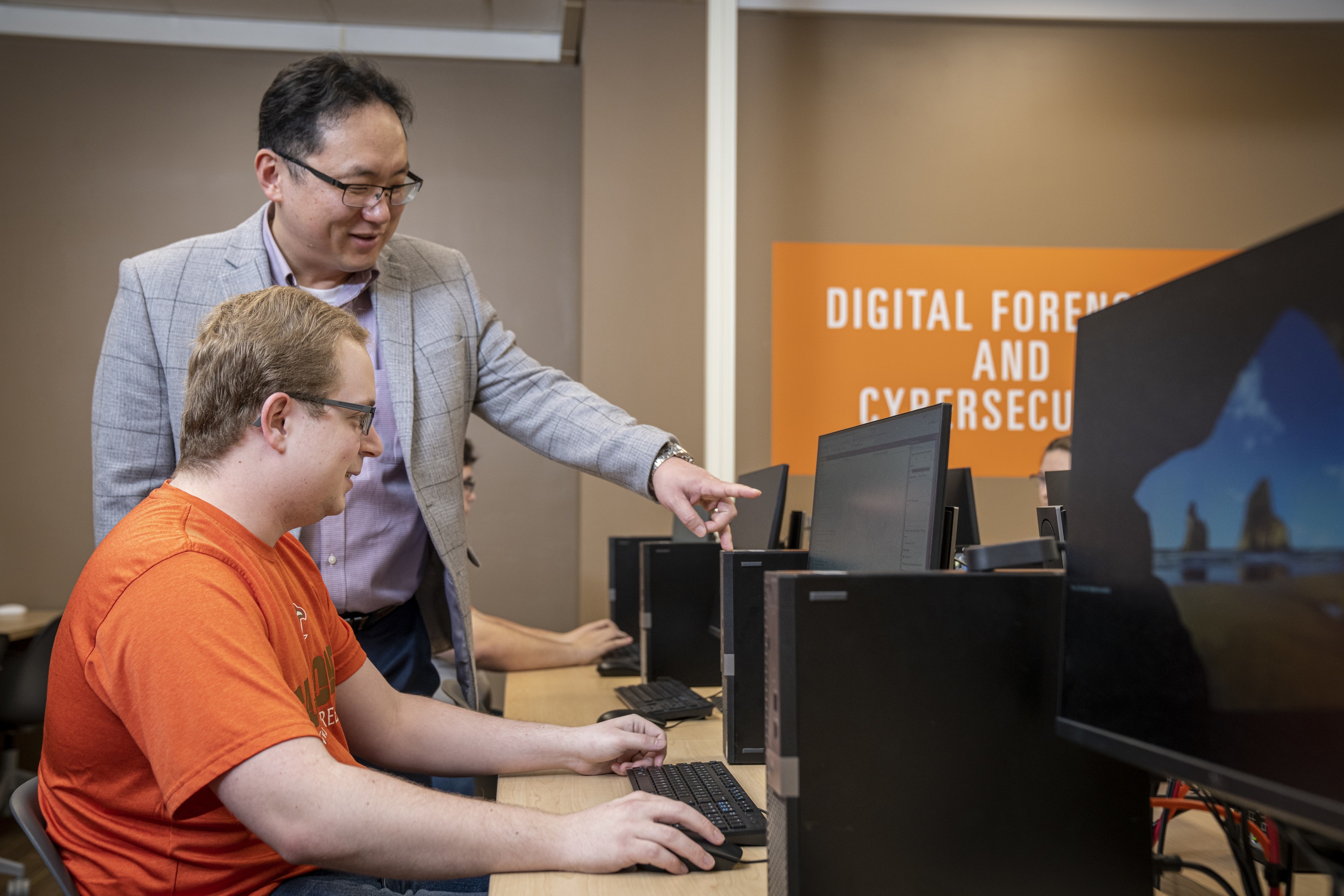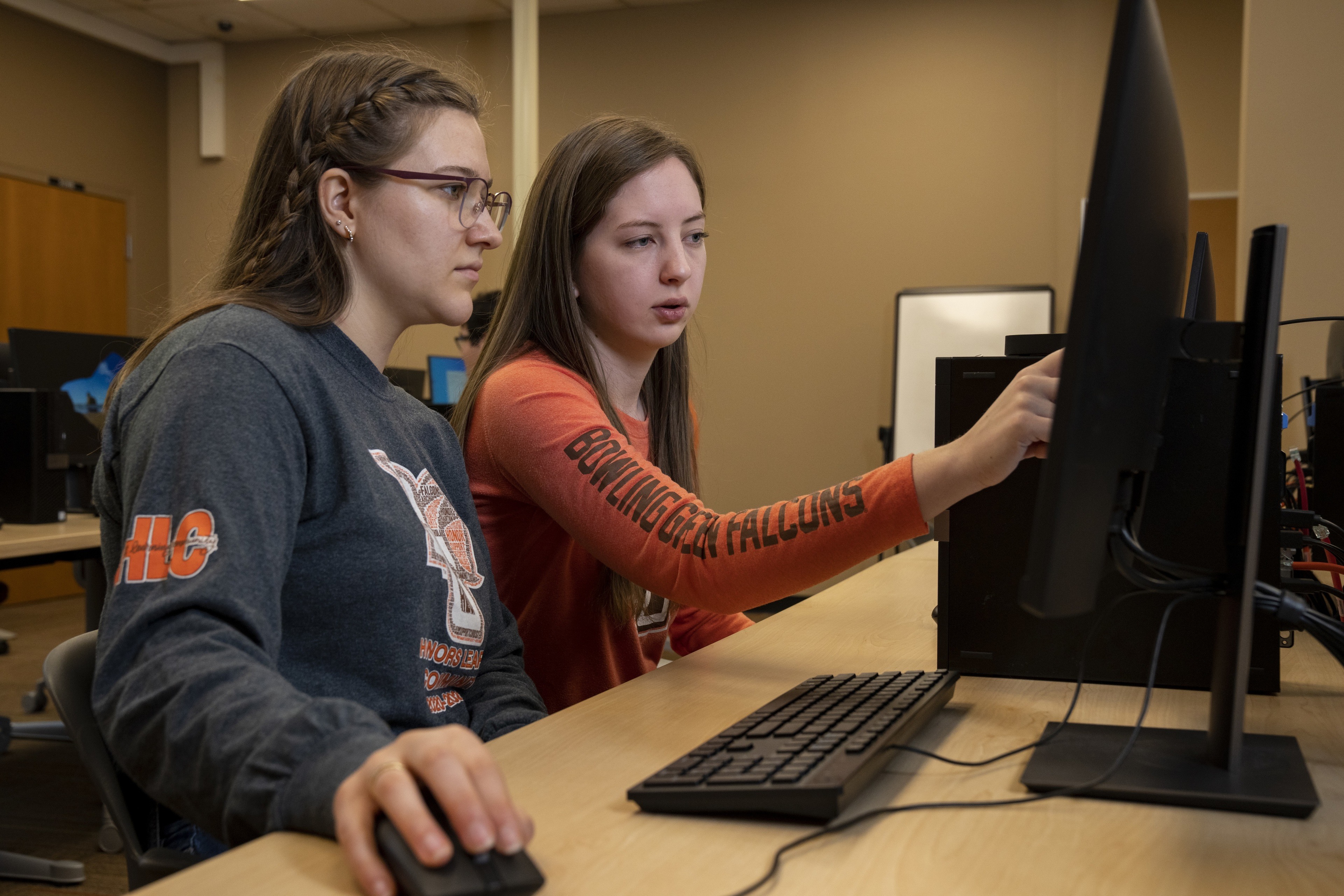
Bachelor of Science (B.S.)
Computer Science: Digital Forensics
A specialization in digital forensics at BGSU provides a unique experience in identifying and responding to cybersecurity breaches and network hacks. The specialization courses also follow the cybersecurity and digital forensics standards by the National Institute of Standards and Technology (NIST).
One of today’s most in-demand fields in the information technology field is digital forensics. It focuses on protection of digital assets and intelligence. Digital forensics is about response: identifying the hack, understanding the source and documenting the attack trace when a breach is made. In recent years, attention has been on digital forensics as cyber-attacks have become more sophisticated and prevalent.
Career – what can you do with a computer science digital forensics degree?
As well as careers in regional and federal law enforcement, digital forensic specialists are in-demand as experienced freelance consultants or in-house experts for larger organizations.
Digital forensic specialists help with live incident response, data recovery, breach analysis and securing weaknesses, as well as assisting law enforcement with tackling instances of fraud, cyber attacks, and other criminal activity.
Career paths
- Computer forensics nvestigator
- Cyber crime investigator
- Cyber security specialist
- Digital security engineer
- Information security analyst
- System security analyst
Quick Facts from the Bureau of Labor Statistics
Internships
Students majoring in computer science, including the digital forensics specialization, must complete at least one co-op or internship before graduation. The BGSU Computer Science Department has connections with many major regional employers where our students do practical computer-related work as full-time or part-time paid interns.
The Computer Science department is also collaborating with the Ohio Bureau of Criminal Investigation facility on campus to provide career-relevant learning and internship opportunities.
Curriculum
The digital forensics specialization provides students a foundation in data collection, recovery, and analysis of digital artifacts from computers, networks, and mobile devices.
Computer science majors with the digital forensics specialization learn the skills to help corporate and criminal justice organizations respond to attacks, identify and preserve evidence, assess the damage done, and identify the attacker. Students learn how to use forensic tools and techniques, including live data forensics, database forensics, network logs and other datasets to develop incidence timelines.
In addition to studying how to collect potential evidence, students learn reverse engineering techniques, forensic data analysis, and reporting protocols.
Digital forensics focuses on the protection of digital assets and intelligence. It is a specialization of the computer science major dedicated to learning how to prevent, identify, and respond to cybersecurity breaches and network hacks.
This curriculum follows the cybersecurity and digital forensics standards from the National Institute of Standards and Technology (NIST). This helps ensure digital evidence gathered can be used in criminal investigations.
This in-demand career will continue to grow as the sophistication and scale of cyber attacks and hacking increase.

Sample courses
- Introduction to Software Security
- Introduction to Computer Security
- Computer and Mobile Forensics
- Network Security and Forensics
- Law, Evidence & Procedure in Forensics Science
While understanding cybersecurity is a key part of digital forensics, it should be considered as the other side of the coin from cybersecurity. While cybersecurity focuses on preventing hacks, digital forensics deals with the aftermath of an attack, the damage inflicted, the evidence and clues left behind to catch the perpetrator.
The area of digital forensics, like other forensic sciences, relies on common standards that are testable and verifiable. The specialization courses follow the cyber security and digital forensics standards established by the National Institute of Standards and Technology (NIST).
Standards ensure that forensic software tools consistently produce accurate and objective test results. Our approach for testing computer forensic tools is based on well-recognized international methodologies for conformance testing and quality testing as well as the NIST standards.
Gathering digital evidence
Digital forensics focuses on the protection of digital assets and intelligence. It is a specialization of the computer science major dedicated to learning how to prevent, identify, and respond to cybersecurity breaches and network hacks.
This curriculum follows the cybersecurity and digital forensics standards from the National Institute of Standards and Technology (NIST). This helps ensure digital evidence gathered can be used in criminal investigations.
This in-demand career will continue to grow as the sophistication and scale of cyber attacks and hacking increase.
The Digital Forensics program is part of the Department of Computer Science in the BGSU College of Arts and Sciences.
Accreditation
Bowling Green State University [BGSU] is accredited by the Higher Learning Commission. BGSU has been accredited by the Higher Learning Commission since 01/01/1916. The most recent reaffirmation of accreditation was received in 2022-2023, with our next reaffirmation of accreditation scheduled for 2032-2033. Questions should be directed to the Office of Institutional Effectiveness.
Request Information
Updated: 08/23/2024 09:48AM

